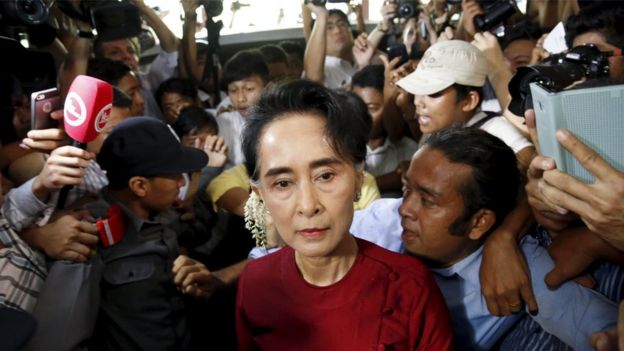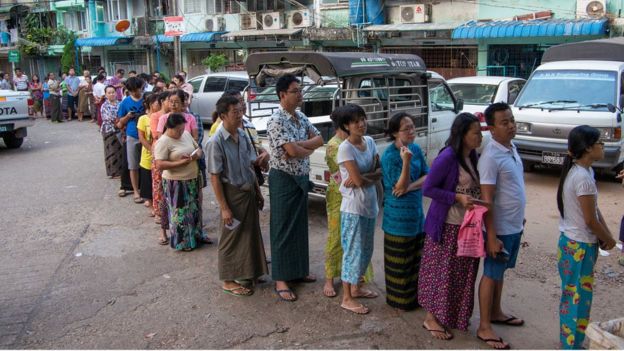Voting is under way in Myanmar’s general election – the first openly contested poll in 25 years after decades of military rule.
The ruling Union Solidarity Development Party (USDP), backed by the military, is one of the frontrunners.
Aung San Suu Kyi’s National League for Democracy (NLD) is expected to make large gains, although she is barred from running for the presidency.
Large crowds gathered in Yangon as Ms Suu Kyi arrived to cast her vote.
Across the country, long queues formed at some polling booths, with reports of people queuing from long before dawn.
“I’ve done my bit for change, for the emergence of democracy,” one voter, former teacher Daw Myin, told Reuters.
About 30 million people are eligible to vote in the election in Myanmar (also known as Burma).
Clear results are not expected until Monday morning.

Aung San Suu Kyi arrived to vote in Yangon amid a large media scrum
More than 6,000 candidates from over 90 parties are vying to be elected to the 664-seat parliament in the first national elections since a nominally civilian government took power in 2011.
However, 25% of seats are reserved for unelected military representatives, who are expected to side with the USDP.
Ms Suu Kyi, a former Nobel Peace Prize laureate, is barred from the presidency as the constitution disqualifies anyone with foreign offspring.
On Thursday, she said she would be “above the president” if her party won. The NLD must take 67% of all contested seats in order to gain a majority.
Current President Thein Sein said he would accept the election result.
At the scene – Jonathan Head, BBC News, Yangon

Jonathan Head/BBC
I watched people lining up in the dark long before the polling station opened in the Kyi Myin Daing neighbourhood, which straddles the Yangon River.
As the sky brightened, the queue stretched to the end of this crowded street and around the corner. There were people of all ages: young women in jeans and T-shirts, older men and women in more traditional Burmese longyis, all clutching their pink national identity cards and white voter registration documents.
The one thing nearly all of them have in common is that they have never before had the opportunity to elect a new government.
There have been reports of irregularities, intimidation and people being left off official voter lists, but, at this polling station, we saw no problems, with officials calmly explaining the procedure for filling out ballot papers and placing them in the sealed boxes.
Here voting took place in a temporary marquee erected between run-down old apartment blocks. Several young men helped lift an older man in his wheelchair inside to vote.
Everyone we spoke to expressed their happiness about this historic moment, and their hope that it would help make theirs a better country.
Hundreds of thousands of people – including minority Rohingya Muslims – have been denied voting rights, raising concerns about the fairness of the poll.
The BBC’s Jonah Fisher in Yangon says there are no reliable opinion polls in the country, so no-one really knows how the vote is going to play out.
Ahead of the vote, security has been stepped up across the country, with some 40,000 police guarding polling stations.
More on Myanmar’s historic election

Decision-making in the Delta: the BBC’s Jonathan Head in the small but crucial town of Hinthada
Elections explained: Why does this vote matter?
‘Abandoned people’: What rights do the Rohingya Muslims have?
Myanmar vote causes business uncertainty
Ruled by the junta for nearly half a century, Myanmar has seen economic and political reform in recent years.
Ms Suu Kyi has already raised concerns about poll fraud and voting irregularities. In the 1990 election, the NLD won a majority, but the results were largely ignored by the generals.
For its part, the government has warned that rapid change could lead to civil unrest.
BBC
 Q FM Africa's Modern Radio
Q FM Africa's Modern Radio